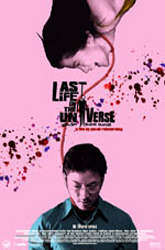 Director:
Pan-ek Ratanaruang
Starring:
Tadanobu Asano
Sinitta Boonyasak
Laila Boonyasak
Yutaka Matsushige
Release: 6 Aug. 04
IMDb
|
Last Life in the Universe 
BY: DAVID PERRY
Pan-ek Ratanaruang’s Last Life in the Universe begins with
the exploration of a fastidiously-kept home, each book in its place, each
shoe prepared for a day of the week, each beer turned label-forward in the
fridge. This is the home of Kenji (Asano), a lonely librarian’s assistant in
Bangkok, Thailand. He’s Japanese, barely knows the Thai language, and has
become accustomed to the lonely lifestyle this situation affords. Having
looked through all the accoutrements of loneliness -- his home seems just a
couple notches past the Ikea compulsiveness of Edward Norton in Fight Club
-- the camera finds Kenji hanging from the ceiling, a suicide note in his
hand reading, “This is bliss.”
The suicide is a dream, but the lifestyle is not. Solemn to a point of
atrophy, the appearance of Kenji’s yakuza brother makes it clear to the
audience that Kenji won’t be living la vita noiosa for much longer. Indeed,
by the time the film’s opening credit has appeared -- thirty minutes into
the picture -- there are two dead bodies rotting in Kenji’s apartment and
he’s living with a Thai woman who lives like a slob.
Partly Bringing Up Baby, partly Lost in Translation, the relationship
between Kenji and his host Noi (Boonyasak) moves glacially through the
impressionistic imagery brought by Ratanaruang and master cinematographer
Christopher Doyle (his images haven’t been this evocative of unbridled
chemistry since In the Mood for Love). One knows that the ultimate
dénouement has to be a mediation -- a cleaner Noi, a less uptight Kenji --
but the often unpredictable story offers many surprises that seem pulled
from Jean-Pierre Melville. Asano, a wonderful proxy for Alain Delon, is the
polar opposite of the characters he normally plays, from the sadistic title
character in Ichi
the Killer to Zatoichi’s nemesis in The Blind Swordsman: Zatoichi. Within
his performance -- amid the long, languid shots of Kenji and Noi
enjoying the act of smoking like no one since the last days of ‘50s film
noir -- is the core of the story, that one’s evasion of loneliness can be a
blessing and a curse. Playing Kenji as a distant, mysterious figure, Asano
grapples with the way one might find solace in one’s self and still wonder
what pleasures and pains await you if you’d only taken a step out of the
house.
 |

